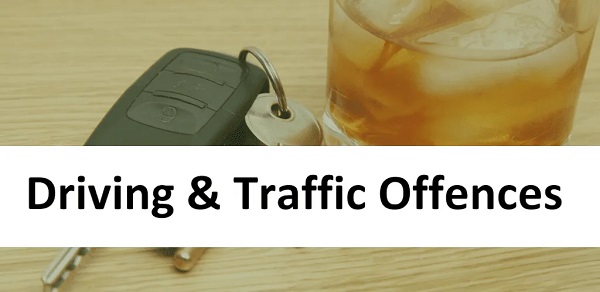Crimes Over Long Weekend: The allure of a long weekend in NSW is hard to resist. Whether you're catching up with mates, heading out of town, or just enjoying a well-earned break, there's a buzz in the air. However, as the festivities wind down, police reports tell a different story, one where risky decisions and heightened tensions often lead to a spike in offences. So, what are the most common crimes and offences after a long weekend, and why do they happen?
Why Crime Spikes Over The Long Weekend
It's no secret that public holidays and long weekends bring out more than just the party spirit. With more people on the roads, crowded venues, and a few extra drinks flowing, the risk of trouble goes up. NSW Police ramp up their presence during these periods, launching high-visibility operations and enforcing double demerits to keep things in check.
However, despite these efforts, statistics show a clear pattern. For instance, certain offences consistently surge after long weekends. Let's take a further look at these numbers and the stories behind them.
Crimes Over Long Weekend: The Usual Suspects
1. Drink Driving and Drug Driving
If you've ever been stuck in a random breath test queue on your way home from a holiday, you're not alone. Drink driving remains one of the most common offences, with police conducting hundreds of thousands of breath tests during long weekends. For example, over the Easter 2025 long weekend, NSW Police carried out 268,274 breath tests and charged 340 people with drink driving. There were also 802 positive drug driving detections.
Why the spike? More social events, more alcohol, and a sense of celebration. However, the consequences are serious-especially with double demerits in play. Just one slip-up could see you lose your licence on the spot, or worse, seriously injure yourself or someone else on the road.
2. Speeding and Dangerous Driving
Speeding fines soar during long weekends. Over the Easter 2025 period, police issued nearly 5,000 speed infringements over Easter 2025 alone. The temptation to "make up time" on busy highways or take risks to beat the traffic is real, but it's a recipe for disaster. Add in distractions like mobile phones (486 offences detected) and not wearing seatbelts (318 offences), and the risk multiplies.
Double demerits mean the stakes are even higher-one speeding ticket could double your points and fast-track a licence suspension.
3. Assaults: Domestic and Non-Domestic
Here's where things get more complex. Assaults, both domestic violence (DV) and non-domestic violence (non-DV), see a marked increase on public holidays and long weekends. According to the NSW Bureau of Crime Statistics and Research, New Year's Day is the worst. On this holiday, non-DV assaults jump 166% above the daily average and DV assaults up 118%. Australia Day and ANZAC Day also see spikes, with non-DV assaults up 89% and 78% respectively.
Why does this happen? Alcohol, crowded gatherings, and the stress of family dynamics can all play a part. The early hours after major celebrations are particularly risky, with assaults peaking between midnight and 3am.
4. Theft and Burglary
While many are away enjoying their break, opportunistic thieves are at work. Property crimes like theft and burglary often rise during holiday periods, with empty homes and visible valuables making easy targets. Police typically respond with targeted operations, but it's a persistent problem.
5. Public Order Offences
With more people out celebrating, offences like disorderly conduct, trespassing, and other public order breaches become more common4. Crowded venues and late-night revelry can quickly escalate into trouble.
Why Do These Offences Spike?
So, what's behind these trends? Several factors come into play:
- Alcohol and Drug Use: More parties mean more drinking, which impairs judgment and increases the likelihood of risky behaviour, from driving to violence.
- Social Gatherings: Crowds can lead to conflicts, especially when emotions run high or alcohol is involved.
- Travel and Traffic: Busy roads, long drives, and the rush to get home can lead to speeding, distraction, and fatigue.
- Family Dynamics: Extended time together can heighten tensions, particularly in households already under stress.
- Opportunity for Crime: Empty homes and relaxed routines create openings for theft and burglary.
Crimes Over Long Weekend Double Demerits
NSW Police don't just sit back and wait for trouble. During long weekends, they roll out special operations targeting the most common offences. This includes:
- Random breath and drug testing stations across major routes
- Extra patrols in entertainment precincts and public spaces
- Surveillance of known trouble spots for assaults and theft
- Enforcement of double demerits for speeding, seatbelt, mobile phone, and helmet offences15
The aim? To deter risky behaviour and keep the community safe. But as the statistics show, the challenge is ongoing.

Crimes Over Long Weekend
Picture this: You're at a family BBQ over the long weekend. The drinks are flowing, and a minor disagreement quickly escalates. Before you know it, police are called, and what started as a celebration ends in an assault charge.
Or maybe you're driving home late after a mate's birthday. You're tired, you check your phone for directions, and suddenly you're pulled over for distracted driving. Remember, double demerits apply, and now your licence is at risk.
These aren't just hypothetical scenarios-they play out across NSW every long weekend.
Practical Solutions for Staying Safe
No one wants their long weekend to end in court or with a criminal record. Here are some practical steps to keep yourself, and your loved ones, out of trouble:
- Plan Your Transport: If you're drinking, organise a designated driver or use public transport.
- Know the Law: Be aware of double demerit periods and what offences they cover.
- Keep Your Cool: Walk away from heated situations, one bad decision can have lasting consequences.
- Secure Your Property: If you're heading away, make your home look lived-in and lock up valuables.
- Look Out for Each Other: Check in with friends and family, especially if you notice rising tensions.
Need a criminal lawyer in NSW?
Long weekends should be about making memories, not mistakes. However, if you do find yourself facing a charge, remember, you're not alone. Legal advice and support are available, and early action can make a big difference.
The content of this article is intended to provide a general guide to the subject matter. Specialist advice should be sought about your specific circumstances.


